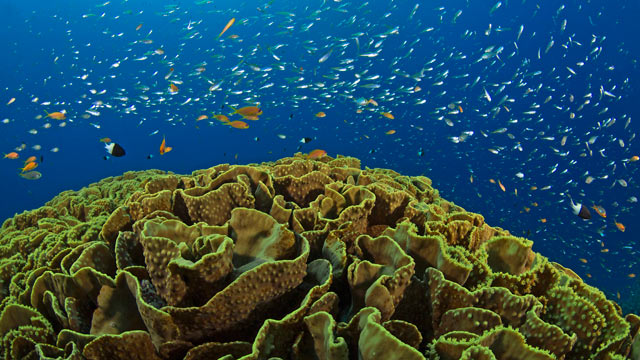Published:

Heriot-Watt and British Geological Survey scientists are research partners in the ambitious, £20 million UKRI GCRF One Ocean Hub, which will transform the global response to the urgent challenges facing our oceans.
From plastic pollution to rising sea levels and acidification to over-fishing, the threats facing our oceans are well-known.
The UKRI GCRF One Ocean Hub will bring together the competing interests and agendas of the individuals, groups and organisations that rely on our oceans to realise a vision of an integrated and sustainable approach to managing their use.
A key priority will be to ensure the knowledge, experiences and rights of those most-reliant upon the oceans, and disproportionately affected by our failure to protect them, are recognised.
The team will set out to uncover the less tangible values of the ocean, and the hidden 'trade-offs' in ocean decision-making.
The goal is to ensure decision-making is based on evidence of risks and opportunities among competing ocean uses.
The five-year programme is being funded by the UK Research and Innovation's Global Challenges Research Fund and will involve more than 50 partners, including world-leading research centres, development organisations, community representatives, governments and multiple UN agencies.
Paul Lusty, British Geological Survey Ore Deposits and Commodities Team Leader, will focus on the potential value of offshore biological, mineral and freshwater resources, while Dr Andrew Sweetman, Associate Professor at Heriot-Watt's Lyell Centre, will investigate the potential impact of extracting these resources on deep-water species, habitats and beyond.
Dr Andrew Sweetman said: “Heriot-Watt is a global university with a track record in innovative, collaborative marine research.
“The deepest parts of our oceans are still relatively unexplored and there is much we do not know about them. The UKRI One Ocean Hub is a global initiative that will inform how we interact with and use the oceans, and help us understand the impact of our activities have on their depths.”
Dr Tracy Shimmield, Director of the Lyell Centre, the BGS- Heriot-Watt collaboration in Edinburgh said: “The UKRI GCRF One Ocean Hub embodies the approach that the Lyell Centre was founded on: using an interdisciplinary approach to build on our scientists' individual and combined expertise in land and marine conservation, geology and geoscience.
“BGS and Heriot-Watt's inclusion in this project is testament to our experience in collaborative, global marine science research programmes. For decades we have been working offshore, from surface to seafloor. We are proud that the Lyell Centre is to be a key part of this innovative project that will explore all facets of the oceans.”
Programme lead, Professor Elisa Morgera, Director of the Strathclyde Centre for Environmental Law & Governance, said: “Millions of people all over the world are entirely reliant upon the ocean for food, jobs and transport yet over-exploitation, competing uses, pollution and climate change are pushing ocean ecosystems towards a tipping point.
“The One Ocean Hub will bridge the current disconnects across law, science and policy to empower local communities, women and youth – who are particularly impacted by decision-making – to co-develop research and solutions.
“The aim is to predict, harness and share equitably environmental, socioeconomic and cultural benefits from ocean conservation and sustainable use.
“The Hub will also identify hidden trade-offs between more easily monetised fishing or mining activities and less-understood values of the ocean's deep cultural role, function in the carbon cycle, and potential in medical innovation.”
Professor Andrew Thompson, UKRI Champion for International and Executive Chair of the Arts and Humanities Research Council (AHRC), said: “The sheer scale and ambition of these Hubs is what makes them so exciting. They enable us to deliver a coordinated global response with UK researchers working in partnership with researchers, governments, NGOs, community groups and international agencies across developing countries.
“Each Hub has the potential to transform the quality of life for multitudes throughout the world and safeguard our planet for future generations.”
Within the initial five years of the programme, the team hopes to advance an integrated and inclusive approach to ocean management at a national level in South Africa, Namibia, Ghana, Fiji and the Solomon Islands that enhances the resilience of marine ecosystems and of vulnerable groups.
The Global Challenges Research Fund (GCRF) is a £1.5 billion fund announced by the UK Government in late 2015 to support cutting-edge research that addresses the challenges faced by developing countries. The One Ocean Hub will help to support the UK's international commitment to the Sustainable Development Goals, in particular SDG 14 on the conservation and sustainable use of the oceans.